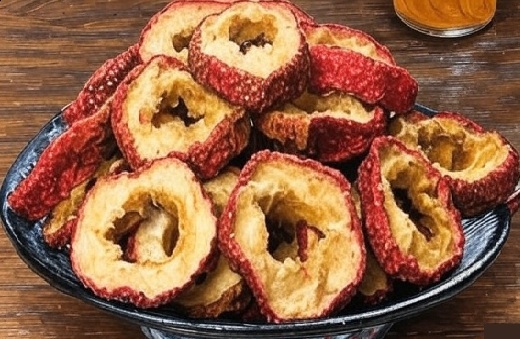Hawthorn Berry

Hawthorn Berry (Shan Zha): A Tangy Herb for Digestion, Circulation, and Heart Health
Introduction
Hawthorn berry, known as Shan Zha (山楂) in Traditional Chinese Medicine (TCM), is a beloved sour and slightly sweet herb used to support digestion, invigorate blood circulation, and promote cardiovascular wellness. Often consumed after heavy meals, Shan Zha is a go-to remedy for food stagnation—especially from meat or greasy foods. It’s also a key herb for enhancing circulation and supporting healthy cholesterol levels, making it popular in both herbal medicine and functional cuisine.
What Is Hawthorn Berry?
Shan Zha is the dried fruit of Crataegus pinnatifida, a small deciduous tree native to China. In TCM, it is classified as sour, sweet, and slightly warm in nature. It primarily enters the Spleen, Stomach, and Liver meridians. Traditionally used to transform food accumulation, move stagnant blood, and relieve abdominal bloating or pain, hawthorn berries also help balance the digestive system and promote heart health. They are often consumed as teas, snacks, or part of medicinal foods.
Health Benefits of Hawthorn Berry
Relieves Food Stagnation and Promotes Digestion
Shan Zha is best known for breaking down accumulated food—especially meat and oily dishes—relieving bloating, fullness, indigestion, or poor appetite.
Invigorates Blood and Dispels Stasis
It helps move blood and is used for conditions involving blood stagnation, such as postpartum abdominal pain or menstrual irregularities.
Supports Cardiovascular Health
Hawthorn is used to promote healthy blood pressure, cholesterol, and circulation, making it beneficial for long-term heart wellness.
Eases Abdominal Distension and Pain
Its digestive action can relieve distension, cramping, or discomfort in the epigastric region, especially when due to overeating or sluggish digestion.
Used in Children’s Digestion Formulas
In small amounts, Shan Zha is commonly included in gentle digestive teas for children to relieve food-related bloating or discomfort.
How to Use Hawthorn Berry
In Soups and Herbal Decoctions
Simmer 9–15 grams of sliced hawthorn fruit with herbs like Shen Qu (medicated leaven), malt, or tangerine peel for 20–30 minutes to support digestion.
In Herbal Teas or Infusions
Brew alone or with chrysanthemum, goji berries, or red dates for a tangy, heart-healthy tea. Steep 6–10 grams in hot water for 10–20 minutes.
As a Snack or Culinary Ingredient
Hawthorn berries are popular as fruit leathers, candies, or jams. Look for sugar-free versions if using therapeutically. They can also be added to congee or dessert soups.
Where to Buy Hawthorn Berry
You can find Shan Zha at the following places:
- Chinese herbal medicine shops
- Asian grocery stores
- Health food stores or apothecaries
- Online retailers such as Amazon, iHerb, or TCM specialty sites
Look for:
- Thin, dried slices of red hawthorn fruit
- Organic or pesticide-free labeling
- Lab-tested or certified sources for safety and purity
Are There Any Side Effects?
Hawthorn berry is generally safe, though its strong digestive action means it should not be used excessively in those with weak digestion or an empty stomach. People with low blood pressure or taking heart medications should consult a healthcare provider before using Shan Zha regularly. Avoid during pregnancy without practitioner supervision.
Conclusion
Hawthorn berry, or Shan Zha, is a tangy, warming herb used in Traditional Chinese Medicine to support digestion, promote blood circulation, and maintain cardiovascular wellness. Whether sipped as tea, simmered in broth, or eaten as a snack, it offers a delicious way to ease fullness and nourish the heart.
FAQs
Can I eat hawthorn berries every day?
Yes, in moderate amounts—especially after meals or as part of a digestive tea.
What do hawthorn berries taste like?
They are tangy, slightly sweet, and fruity with a puckering effect, especially when dried or brewed.
Are hawthorn berries safe for children?
Yes, in small doses. Often included in pediatric formulas to relieve mild indigestion or bloating.

